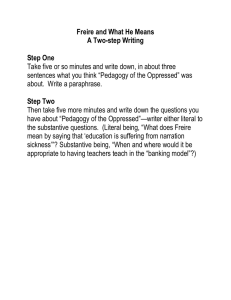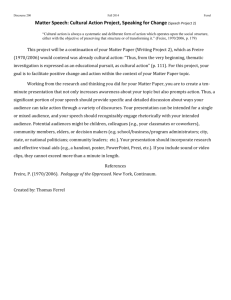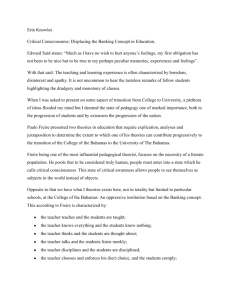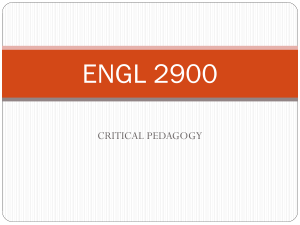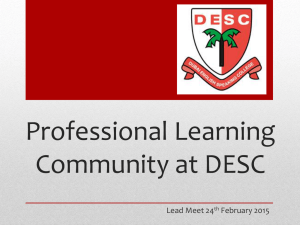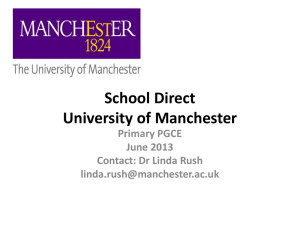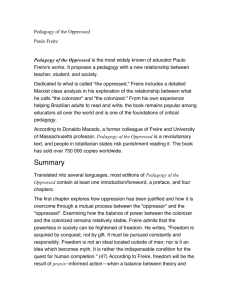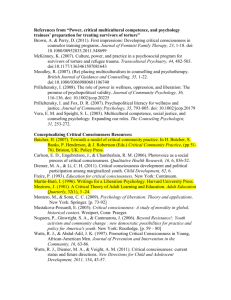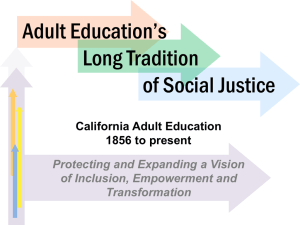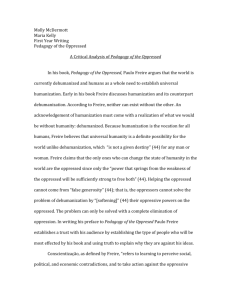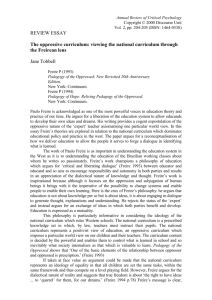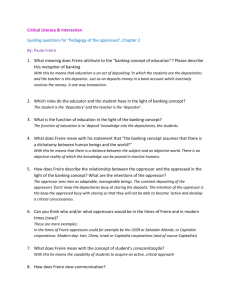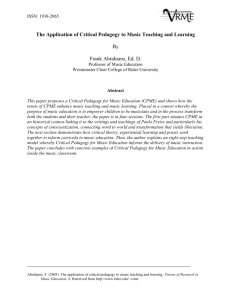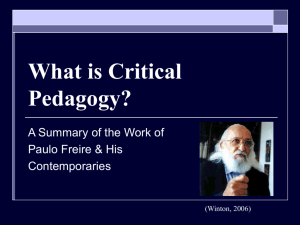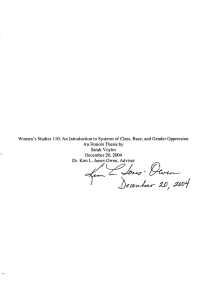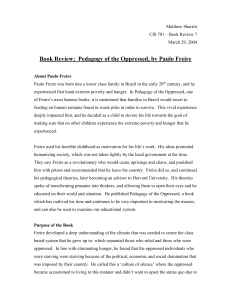Popular education. An introduction to practice plus an annotated
advertisement
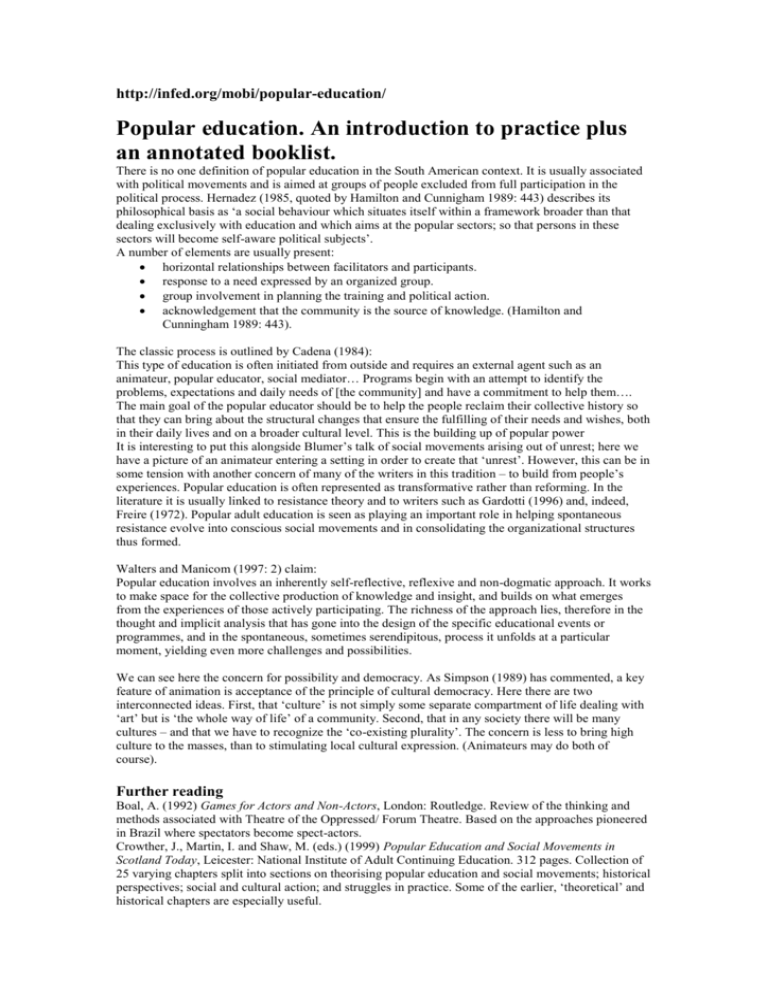
http://infed.org/mobi/popular-education/ Popular education. An introduction to practice plus an annotated booklist. There is no one definition of popular education in the South American context. It is usually associated with political movements and is aimed at groups of people excluded from full participation in the political process. Hernadez (1985, quoted by Hamilton and Cunnigham 1989: 443) describes its philosophical basis as ‘a social behaviour which situates itself within a framework broader than that dealing exclusively with education and which aims at the popular sectors; so that persons in these sectors will become self-aware political subjects’. A number of elements are usually present: horizontal relationships between facilitators and participants. response to a need expressed by an organized group. group involvement in planning the training and political action. acknowledgement that the community is the source of knowledge. (Hamilton and Cunningham 1989: 443). The classic process is outlined by Cadena (1984): This type of education is often initiated from outside and requires an external agent such as an animateur, popular educator, social mediator… Programs begin with an attempt to identify the problems, expectations and daily needs of [the community] and have a commitment to help them…. The main goal of the popular educator should be to help the people reclaim their collective history so that they can bring about the structural changes that ensure the fulfilling of their needs and wishes, both in their daily lives and on a broader cultural level. This is the building up of popular power It is interesting to put this alongside Blumer’s talk of social movements arising out of unrest; here we have a picture of an animateur entering a setting in order to create that ‘unrest’. However, this can be in some tension with another concern of many of the writers in this tradition – to build from people’s experiences. Popular education is often represented as transformative rather than reforming. In the literature it is usually linked to resistance theory and to writers such as Gardotti (1996) and, indeed, Freire (1972). Popular adult education is seen as playing an important role in helping spontaneous resistance evolve into conscious social movements and in consolidating the organizational structures thus formed. Walters and Manicom (1997: 2) claim: Popular education involves an inherently self-reflective, reflexive and non-dogmatic approach. It works to make space for the collective production of knowledge and insight, and builds on what emerges from the experiences of those actively participating. The richness of the approach lies, therefore in the thought and implicit analysis that has gone into the design of the specific educational events or programmes, and in the spontaneous, sometimes serendipitous, process it unfolds at a particular moment, yielding even more challenges and possibilities. We can see here the concern for possibility and democracy. As Simpson (1989) has commented, a key feature of animation is acceptance of the principle of cultural democracy. Here there are two interconnected ideas. First, that ‘culture’ is not simply some separate compartment of life dealing with ‘art’ but is ‘the whole way of life’ of a community. Second, that in any society there will be many cultures – and that we have to recognize the ‘co-existing plurality’. The concern is less to bring high culture to the masses, than to stimulating local cultural expression. (Animateurs may do both of course). Further reading Boal, A. (1992) Games for Actors and Non-Actors, London: Routledge. Review of the thinking and methods associated with Theatre of the Oppressed/ Forum Theatre. Based on the approaches pioneered in Brazil where spectators become spect-actors. Crowther, J., Martin, I. and Shaw, M. (eds.) (1999) Popular Education and Social Movements in Scotland Today, Leicester: National Institute of Adult Continuing Education. 312 pages. Collection of 25 varying chapters split into sections on theorising popular education and social movements; historical perspectives; social and cultural action; and struggles in practice. Some of the earlier, ‘theoretical’ and historical chapters are especially useful. Freire, P. (1972) Pedagogy of the Oppressed, London: Penguin. 153 pages. One of the most significant books published on education in the second half of the twentieth century. Chapter 1 attempts to justify a pedagogy of the oppressed and explores the relationship of oppressors and the oppressed. Chapter 2 sets out a ‘banking’ concept of education and sets it against a ‘problem-posing’ concept. Education is presented as a world-mediated mutual process, and man as an incomplete being seeking to become more fully human. Chapter 3 is a ‘classic’ chapter, focusing on dialogue and praxis. Dialogics is presented as the essence of education as the practice for freedom. The subject-object relationship is explored and the notion of ‘generative themes’ and how these may awaken critical consciousness is examined. Chapter 4 analyses ‘the theories of cultural action that develop from anti-dialogical and dialogical matrices’. Includes material on manipulation, cultural invasion (with significant reference to conscientization) co-operation, unity for liberation, organization and cultural synthesis. See, also, the ‘talking book’ – P. Freire and I. Shor (1987) A Pedagogy for Liberation. Dialogues on transforming education, London: Macmillan. Gadotti, M. (1996) Pedagogy of Praxis. A dialectical philosophy of education, New York: SUNY Press. 216 + xxx pages. ‘In pedagogy’, Gadotti writes, ‘the practice is the horizon, the aim of the theory. Therefore the educationalist lives the instigating dialectic between his or her daily life – the lived school and the projected school – which attempts to inspire a new school‘. This book draws upon a variety of sources to develop ‘an education for the future’. Chapters deal with dialectics; bourgeois education; critical pedagogy; education and the class struggle; a single school for everyone; school as a sociocultural project; citizen school and socio-cultural diversity and education for all. Holst, J. D. (2002) Social Movements, Civil Society, and Radical Adult Education, New York: Bergin and Garvin. Kane, L. (2001) Popular Education and Social Change in Latin America, London: Latin America Bureau. 304 pages. This books provides an overview of popular education in Latin America, an exploration of its methodology and ideology, plus two substantial case studies. Kane also makes an assessment of its micro and macro impact, examines future directions, and reviews the contribution of Freire. Mayo, M. (1997) Imagining Tomorrow: Community adult education for transformation, Leicester: National Institute of Adult Continuing Education. 172 pages. . A readable and very useful overview of education for transformation. Argues that community and workplace-based adult education is increasingly important in first and third world contexts. The book examines globalization and restructuring, and presents a case for the possibilities of local development as part of longer term strategies for transformation. Chapters deal with competing perspectives; the histories of adult education for transformation; the experience of education for transformation in the South; economic restructuring; adult education and training; analysing political power and building alliances; adult and community education; and cultures of resistance. Poster, C. and Zimmer, J. (eds.) (1993) Community Education in the Third World, London: Routledge. 253 + x pages. While titled ‘community education’, this book could equally have been an exploration of popular education. There are three substantive sections dealing with survival and self-realization; changing economic structures; and developing frameworks for the future. At least nine of the chapters are written from within recognizable ‘popular education’ traditions. Walters, S. and Manicom, L. (eds.) (1996) Gender in Popular Education. Methods for empowerment, London: Zed Books. Collection of pieces on feminist adult education work in community organizations, development projects, formal insitutions and community education initiatives in various countries.Doubly helpful book as it documents feminist popular education (which is not properly represented in the English language literature) and provides an overview of poluar education. Other references Hamilton, E. and Cunningham, P. M. (1989) ‘Community-based adult education’ in S. B. Merriam and P. M. Cunningham (eds.) Handbook of Adult and Continuing Education, San Francisco: Jossey-Bass.
